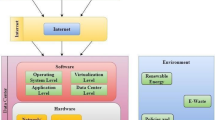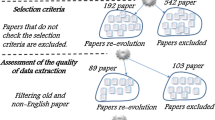Abstract
Resource provisioning of appropriate resources to cloud workloads depends on the quality of service (QoS) requirements of cloud applications and is a challenging task. In cloud environment, heterogeneity, uncertainty and dispersion of resources encounter a problem of allocation of resources, which cannot be addressed with existing resource management frameworks. Resource scheduling, if done after efficient resource provisioning, will be more effective and the cloud resources would be scheduled as per the user requirements (QoS) on provisioned resources. Execution of cloud workloads should be as per QoS parameters to fully satisfy the cloud consumer. Therefore, based on QoS parameters, it is mandatory to predict and verify the resource provisioning before actual resource scheduling. In this paper, a resource provisioning and scheduling framework has been presented which caters to provisioned resource distribution and scheduling of resources. Cloud workloads have been re-clustered using k-means-based clustering algorithm after firstly clustering them through workload patterns to identify the QoS requirements of a workload, and then based on identified QoS requirements resources are provisioned before actual scheduling. Further, scheduling has been done based on different scheduling policies. Finally, the performance of the proposed framework has been evaluated in both real and simulated cloud environment and experimental results show that the framework provisions and schedules resource efficiently by considering energy consumption, execution cost and execution time as QoS parameters.





















Similar content being viewed by others
References
Singh S, Chana I (2015) QoS-aware autonomic resource management in cloud computing: a systematic review. ACM Comput Surv 48(3):1–46
Singh S, Chana I (2016) Cloud resource provisioning: survey, status and future research directions. Knowl Inform Syst 44:1–50
Singh S, Chana I (2016) A survey on resource scheduling in cloud computing issues and challenges. J Grid Comput 14:1–50
Chana I, Singh S (2014) Quality of service and service level agreements for cloud environments: issues and challenges. Cloud computing-challenges, limitations and R&D solutions. Springer International Publishing, pp 51–72
Singh S, Chana I (2015) Q-aware: quality of service based cloud resource provisioning. Comput Electr Eng 47:138–160. doi:10.1016/j.compeleceng.2015.02.003
Singh S, Chana I (2015) QRSF: QoS-aware resource scheduling framework in cloud computing. J Supercomput 71(1):241–292
Lee YC, Zomaya AY (2012) Energy efficient utilization of resources in cloud computing systems. J Supercomput 60(2):268–280
Kliazovich D (2012) GreenCloud: a packet-level simulator of energy-aware cloud computing data centers. J Supercomput 62(3):1263–1283
Wang WJ, Chang YS, Lo WT, Lee YK (2013) Adaptive scheduling for parallel tasks with QoS satisfaction for hybrid cloud environments. J Supercomput 66(2):783–811
Li C (2012) Optimal resource provisioning for cloud computing environment. J Supercomput 62(2):989–1022
Ergu D, Kou G, Peng Y, Shi Y, Shi Y (2013) The analytic hierarchy process: task scheduling and resource allocation in cloud computing environment. J Supercomput 64(3):835–848
Lee HM, Jeong YS (2014) Performance analysis based resource allocation for green cloud computing. J Supercomput 69(3):1013–1026
Quiroz A, Kim H, Parashar M, Gnanasambandam N, Sharma N (2009) Towards autonomic workload provisioning for enterprise grids and clouds. In: Grid Computing, 2009 10th IEEE/ACM International Conference on. IEEE, pp 50–57
Vecchiola C, Calheiros RN, Karunamoorthy D, Buyya R (2012) Deadline-driven provisioning of resources for scientific applications in hybrid clouds with Aneka. Future Gener Comput Syst 28(1):58–65
Herbst NR, Huber N, Kounev S, Amrehn E (2014) Self-adaptive workload classification and forecasting for proactive resource provisioning. Concurrency Comput Pract Exp 26(12):2053–2078
Qavami HR, Jamali S, Akbari MK, Javadi B (2014) Dynamic resource provisioning in cloud computing: a heuristic markovian approach. In: Cloud computing, lecture notes of the institute for computer sciences, social informatics and telecommunications engineering, vol 133. Springer International Publishing, pp 102–111
Varalakshmi P, Ramaswamy A, Balasubramanian A, Vijaykumar P (2011) An optimal workflow based scheduling and resource allocation in cloud. Advances in computing and communications. Springer, Berlin, Heidelberg
Li K, Xu G, Zhao G, Dong Y, Wang D (2011) Cloud task scheduling based on load balancing ant colony optimization. In: Chinagrid Conference (ChinaGrid), 2011 Sixth Annual. IEEE, pp 3–9
Topcuoglu H, Hariri S, Wu M-Y (1999) Task scheduling algorithms for heterogeneous processors. In: Heterogeneous computing workshop, (HCW’99), San Juan, Puerto Rico
Pandey S, Wu L, Guru S, Buyya R (2010) A particle swarm optimization-based heuristic for scheduling workflow applications in cloud computing environments. In: Advanced information networking and applications (AINA), 24th IEEE international conference, Perth, Australia
Cordeschi N, Shojafar M, Baccarelli E (2013) Energy-saving self-configuring networked data centers. Comput Netw 57(17):3479–3491
Cordeschi N, Shojafar M, Amendola D, Baccarelli E (2014) Energy-efficient adaptive networked datacenters for the QoS support of real-time applications. J Supercomput 71(2):448–478
Singh S, Chana I (2015) EARTH: Energy-aware autonomic resource scheduling in cloud computing. J Intell Fuzzy Syst Syst:1–20. IOS Press doi:10.3233/IFS-151866
Singh S, Chana I, Buyya R (2015) Agri-Info: cloud based autonomic system for delivering agriculture as a service. Technical Report CLOUDS-TR-2015-2, cloud computing and distributed systems laboratory, the University of Melbourne, pp 1–31. Retrieved from http://www.cloudbus.org/reports/AgriCloud2015.pdf
Singh S, Chana I (2013) Efficient cloud workload management framework. Masters Dissertation, Thapar University, India. Retrieved From: http://dspace.thapar.edu:8080/dspace/bitstream/10266/2247/1/sukhpal_singh_me_thesis.pdf
Calheiros RN, Rajiv R, De Rose César AF, Rajkumar B (2009) CloudSim: a novel framework for modeling and simulation of cloud computing infrastructures and services. Grid Computing and Distributed Systems Laboratory, The University of Melbourne, Australia
Liu K, Jin H, Chen J, Liu X, Yuan D, Yang Y (2010) A compromised-time-cost scheduling algorithm in swindew-c for instance-intensive cost-constrained workflows on a Cloud computing platform. Int J High Perform Comput Appl 24(4):445–456
Calheiros RN, Vecchiola C, Karunamoorthy D, Buyya R (2012) The Aneka platform and QoS-driven resource provisioning for elastic applications on hybrid Clouds. Future Gener Comput Syst 28(6):861–870
Acknowledgments
One of the authors, Sukhpal Singh (SRF-Professional), acknowledges the Department of Science and Technology (DST), Government of India, for awarding him the INSPIRE (Innovation in Science Pursuit for Inspired Research) Fellowship (Registration/IVR Number: 201400000761 [DST/INSPIRE/03/2014/000359]) to carry out this research work. We would like to thank all the anonymous reviewers for their valuable comments and suggestions for improving the paper. We would also like to thank Dr. Maninder Singh [EC-Council’s Certified Ethical Hacker (C-EH)] for his valuable suggestions
Author information
Authors and Affiliations
Corresponding author
Rights and permissions
About this article
Cite this article
Singh, S., Chana, I. Resource provisioning and scheduling in clouds: QoS perspective. J Supercomput 72, 926–960 (2016). https://doi.org/10.1007/s11227-016-1626-x
Published:
Issue Date:
DOI: https://doi.org/10.1007/s11227-016-1626-x




